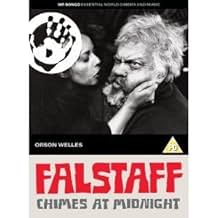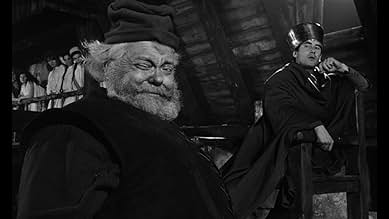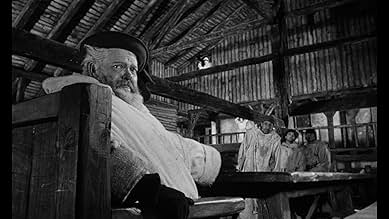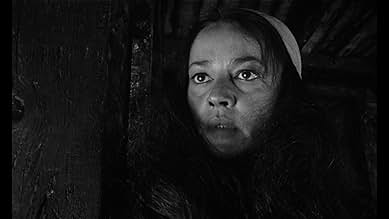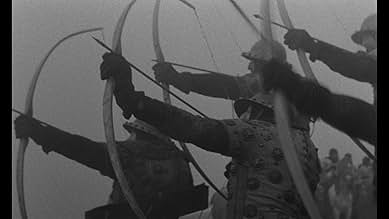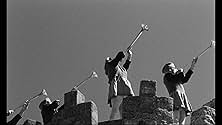IMDb-BEWERTUNG
7,6/10
10.756
IHRE BEWERTUNG
Füge eine Handlung in deiner Sprache hinzuWhen King Henry IV ascends to the throne, his heir, the Prince of Wales, is befriended by Sir John Falstaff, an old, overweight, fun-loving habitual liar. Through Falstaff's eyes we see the ... Alles lesenWhen King Henry IV ascends to the throne, his heir, the Prince of Wales, is befriended by Sir John Falstaff, an old, overweight, fun-loving habitual liar. Through Falstaff's eyes we see the reign of King Henry IV and the rise of Henry V.When King Henry IV ascends to the throne, his heir, the Prince of Wales, is befriended by Sir John Falstaff, an old, overweight, fun-loving habitual liar. Through Falstaff's eyes we see the reign of King Henry IV and the rise of Henry V.
- Regie
- Drehbuch
- Hauptbesetzung
- Nominiert für 1 BAFTA Award
- 3 Gewinne & 2 Nominierungen insgesamt
Michael Aldridge
- Pistol
- (as Michael Aldrich)
Andrés Mejuto
- Woman's Tailor
- (as Andres Mejuto)
José Nieto
- Northumberland
- (as Jose Nieto)
Empfohlene Bewertungen
The career of Shakespeare's Sir John Falstaff (Orson Welles) as roistering companion to young Prince Hal (Keith Baxter), circa 1400-1413.
Who can say bad things about Orson Welles? His work was often neglected in his lifetime, both by audiences and critics. Looking back now, I wonder how they could have missed the genius of "Citizen Kane". But yet, they did for many years.
This film is considered to be Welles' favorite of his own (I am unsure of the source for this claim) and has been influential. Yet, it is hard to get a decent copy (the one I have was a Portuguese import). There was no actor with such a presence as Welles, so Shakespeare is natural for him. He has successfully brought the stage to screen.
Who can say bad things about Orson Welles? His work was often neglected in his lifetime, both by audiences and critics. Looking back now, I wonder how they could have missed the genius of "Citizen Kane". But yet, they did for many years.
This film is considered to be Welles' favorite of his own (I am unsure of the source for this claim) and has been influential. Yet, it is hard to get a decent copy (the one I have was a Portuguese import). There was no actor with such a presence as Welles, so Shakespeare is natural for him. He has successfully brought the stage to screen.
By far the best of Welle's three Shakespearean adaptations this is also arguably THE best Shakespeare on screen. Most filmmakers go for the tragedies - vide Welles himself - or settle for Romeo and Juliet but the History plays are seldom tackled. Here the maestro dips into several texts - most heavily into the two parts of Henry 1V but also Merry Wives, Henry V, Richard 11 - and then welds them together seamlessly to give an in-depth portrait of Falstaff. With a nice touch of irony the narration is spoken by Ralph Richardson who, prior to Welles here, was the definitive Falstaff - and remains so as far as theatre is concerned. It's hard to fault so I won't try, merely revel in a touch of greatness. 10/10
Shakespeare Scholars are always complaining how this film used and abused Shakespeare's plays but I think what was done in this film was pretty clever: Take the character of Falstaff from several plays and piece them together to get a complete picture of the man.
Of the two Orson Welles Shakespeare films I've seen, this one and "Othello" (1954), both had the ability to make me want to read Shakespeare's plays and any film that makes you want to read what the author wrote is a very positive thing to say about a film. So there Shakespeare Scholars!
I did go out and buy the books with the plays used in this film, much like trying to solve a puzzle to see how the pieces really fit. And Orson did twist and bend things a little to make it come out his way.
I also read in Videohound's "World Cinema" (1999) by Elliot Wilhelm that this film may be getting a restoration. If it's as good a restoration as "Othello", I'm looking forward to it!
Welles as Falstaff really shines in this film and Falstaff's later rejection by Henry V is one of the most sobering in cinema. And Welles still has some very creative power left in him by 1965, look at the Battle of Shrewsbury scenes. When it comes to battle scenes they've been done probably only 10 different ways by 1000 directors in a 1000 movies over the years, but this one is probably the most memorable. It's also strange to have in the heat of battle Falstaff looking like a big metal beach ball running around back and forth trying to avoid any conflict.
This film is also a good example of good music and how to use it in a film and it's another one of my favorite movies about Merrie ol' England.
Of the two Orson Welles Shakespeare films I've seen, this one and "Othello" (1954), both had the ability to make me want to read Shakespeare's plays and any film that makes you want to read what the author wrote is a very positive thing to say about a film. So there Shakespeare Scholars!
I did go out and buy the books with the plays used in this film, much like trying to solve a puzzle to see how the pieces really fit. And Orson did twist and bend things a little to make it come out his way.
I also read in Videohound's "World Cinema" (1999) by Elliot Wilhelm that this film may be getting a restoration. If it's as good a restoration as "Othello", I'm looking forward to it!
Welles as Falstaff really shines in this film and Falstaff's later rejection by Henry V is one of the most sobering in cinema. And Welles still has some very creative power left in him by 1965, look at the Battle of Shrewsbury scenes. When it comes to battle scenes they've been done probably only 10 different ways by 1000 directors in a 1000 movies over the years, but this one is probably the most memorable. It's also strange to have in the heat of battle Falstaff looking like a big metal beach ball running around back and forth trying to avoid any conflict.
This film is also a good example of good music and how to use it in a film and it's another one of my favorite movies about Merrie ol' England.
Up front I think it's fair to admit that I have not read the plays Shakespeare wrote that provide the basis of this film and it's screenplay.
I've read Romeo and Juliet, Macbeth and Julius Ceaser and I'm blessed that my public education provided me that much. But when it comes to Henry the IV, V, or VI I'm pretty much in the dark.
Chimes of Midnight did not leave me in the dark however. Orson Welles, I think, did a wonderful job of translating Shakespeaian dialogue into action that could be understood, jokes that could be understood, dramatic tension that could be understood.
Not only do i realize I am 400 years removed from Shakespeare but I am also 53 years removed from whatever audience Orson Welles intended this for in in 1965.
But I don't feel removed from the artistry that it took to make this film.
I could follow the plot, I knew where characters were emotionally, and even better, I understood the jokes. Which, for me, was a huge windfall and a source of amazement.
Orson Welles was dead before I was even born and I find him totally captivating and engaging in this film. He's lovable, he's a rapscallion, he's larger than life and he breaks your heart when he's denied by the newly crowned king.
I'm coming to this as an outsider. I loved Citizen Kane and Touch of Evil, I immensely enjoyed F is for Fake, and I've been looking to engage in more films starring or directed by Orson Welles, and I walked away from this film feeling like it filled a gap.
Here was his passion for gorgeous cinematography, here was his love of the stage, here was his brilliance at translating plays, here was his love for acting here was his passion for entertainment.
At no point did this film drag for me, and even now, in 2017 did the battle scene not only engage, but surprise me. This IS masterclass film making and this film deserved a wider audience back in 1965 and it deserves it still today.
Absolutely riveting and amazing work.
I've read Romeo and Juliet, Macbeth and Julius Ceaser and I'm blessed that my public education provided me that much. But when it comes to Henry the IV, V, or VI I'm pretty much in the dark.
Chimes of Midnight did not leave me in the dark however. Orson Welles, I think, did a wonderful job of translating Shakespeaian dialogue into action that could be understood, jokes that could be understood, dramatic tension that could be understood.
Not only do i realize I am 400 years removed from Shakespeare but I am also 53 years removed from whatever audience Orson Welles intended this for in in 1965.
But I don't feel removed from the artistry that it took to make this film.
I could follow the plot, I knew where characters were emotionally, and even better, I understood the jokes. Which, for me, was a huge windfall and a source of amazement.
Orson Welles was dead before I was even born and I find him totally captivating and engaging in this film. He's lovable, he's a rapscallion, he's larger than life and he breaks your heart when he's denied by the newly crowned king.
I'm coming to this as an outsider. I loved Citizen Kane and Touch of Evil, I immensely enjoyed F is for Fake, and I've been looking to engage in more films starring or directed by Orson Welles, and I walked away from this film feeling like it filled a gap.
Here was his passion for gorgeous cinematography, here was his love of the stage, here was his brilliance at translating plays, here was his love for acting here was his passion for entertainment.
At no point did this film drag for me, and even now, in 2017 did the battle scene not only engage, but surprise me. This IS masterclass film making and this film deserved a wider audience back in 1965 and it deserves it still today.
Absolutely riveting and amazing work.
I won't belabor the point that you can gather from reading 40+ other reviews, so I will offer a few short words on the theme of the movie, as well as caveat, for watching Orson Welles' Chimes at Midnight.
The film overall deals with that time-honored notion noted by St. Paul "When I was a child, I used to talk like a child, and see things as a child does, and think like a child; but now that I have become an adult, I have finished with all childish ways." Prince Hal is growing up and becoming an adult, and as such must soon leave his childish pranks and habits behind. His friend, Falstaff, is that childhood friend (paradoxically old in age, as if he never grew up himself). Boisterous, drunk, and a glutton, the blowhard gleefully recounts all the good times that he, Prince Hal, and their other misfits used to have, doing the things that children and adolescents do, like being a nuisance, harassing others, and goofing off. It is the type of life Falstaff still leads and he is quite happy with it. Prince Hal is, too, until the weight of responsibility is slowly thrust upon him thanks to his sick father. As the stakes are raised, he slowly loses the time and desire to be a silly young boy and now must be a man.
Falstaff is oblivious to this development all the way until the end, thinking that these are just momentary phases before the parties can begin anew. He is ever hopeful that the Prince and the world will see things his way. He fails to see how the world moves past a fat, blundering fool. His love for the prince, for the girls of the bawdy bar, for his compatriots is, while sometimes humorous and self-serving, he nonetheless wishes no real ill on anyone and merely lives for fun and pleasure. In his old age, he has decided that being an adult (if he ever was one) is not something worth putting time and energy in to. He is unimportant and carefree enough to have that luxury; however, his closest friends cannot shirk away from their duties as men, and thus Falstaff fails to realize how he is left behind.
All of this is turned into a moving portrait. We realize that Falstaff is wrong, and that sometimes the world calls for more than just joking around, goofing off and indulging one's self. But we sympathize with him, because we can see a gentle and loving person underneath the bluster and idiocy - and perhaps we ourselves wish the world were more "childish" and carefree. At the climactic battle scene (were Welles' camera work makes a hundred men or less look like a thousand), men grind and pulverize each other into hamburger meat - but Falstaff never manages to hurt a single soul. Perhaps there is some good in being childish!
For those wishing to watch the movie, the Criterion package is an excellent one. The customary supplemental materials are fascinating, and the picture brings out Welles' cinematography. Criterion and co. did there best with the sound, and the sound is the biggest single issue with which you will struggle with (or at least I did) with Chimes. Even with work done on it, the sound levels are inconsistent, especially with actors' lines. Sometimes whole scenes will go by with what sounds like dubbers mumbling their lines, straining your ears and making you crank the volume up on your TV. Then all of the sudden someone will speak loudly and clearly, blowing you back with the force of it and making you quickly turn the volume back down... only for the process to repeat again. I have not done this yet, but I would probably recommend watching with subtitles on to help alleviate the issue of figuring out what some of the whispers and mumbles are supposed to be. Not an elegant solution, but with Welles' later work, you will have to deal with some technical issue or another.
Don't let the above turn you off from seeing this beautiful, and moving film. It is a worthy adaptation and remix of Shakespeare and one of Welles' greatest movies.
The film overall deals with that time-honored notion noted by St. Paul "When I was a child, I used to talk like a child, and see things as a child does, and think like a child; but now that I have become an adult, I have finished with all childish ways." Prince Hal is growing up and becoming an adult, and as such must soon leave his childish pranks and habits behind. His friend, Falstaff, is that childhood friend (paradoxically old in age, as if he never grew up himself). Boisterous, drunk, and a glutton, the blowhard gleefully recounts all the good times that he, Prince Hal, and their other misfits used to have, doing the things that children and adolescents do, like being a nuisance, harassing others, and goofing off. It is the type of life Falstaff still leads and he is quite happy with it. Prince Hal is, too, until the weight of responsibility is slowly thrust upon him thanks to his sick father. As the stakes are raised, he slowly loses the time and desire to be a silly young boy and now must be a man.
Falstaff is oblivious to this development all the way until the end, thinking that these are just momentary phases before the parties can begin anew. He is ever hopeful that the Prince and the world will see things his way. He fails to see how the world moves past a fat, blundering fool. His love for the prince, for the girls of the bawdy bar, for his compatriots is, while sometimes humorous and self-serving, he nonetheless wishes no real ill on anyone and merely lives for fun and pleasure. In his old age, he has decided that being an adult (if he ever was one) is not something worth putting time and energy in to. He is unimportant and carefree enough to have that luxury; however, his closest friends cannot shirk away from their duties as men, and thus Falstaff fails to realize how he is left behind.
All of this is turned into a moving portrait. We realize that Falstaff is wrong, and that sometimes the world calls for more than just joking around, goofing off and indulging one's self. But we sympathize with him, because we can see a gentle and loving person underneath the bluster and idiocy - and perhaps we ourselves wish the world were more "childish" and carefree. At the climactic battle scene (were Welles' camera work makes a hundred men or less look like a thousand), men grind and pulverize each other into hamburger meat - but Falstaff never manages to hurt a single soul. Perhaps there is some good in being childish!
For those wishing to watch the movie, the Criterion package is an excellent one. The customary supplemental materials are fascinating, and the picture brings out Welles' cinematography. Criterion and co. did there best with the sound, and the sound is the biggest single issue with which you will struggle with (or at least I did) with Chimes. Even with work done on it, the sound levels are inconsistent, especially with actors' lines. Sometimes whole scenes will go by with what sounds like dubbers mumbling their lines, straining your ears and making you crank the volume up on your TV. Then all of the sudden someone will speak loudly and clearly, blowing you back with the force of it and making you quickly turn the volume back down... only for the process to repeat again. I have not done this yet, but I would probably recommend watching with subtitles on to help alleviate the issue of figuring out what some of the whispers and mumbles are supposed to be. Not an elegant solution, but with Welles' later work, you will have to deal with some technical issue or another.
Don't let the above turn you off from seeing this beautiful, and moving film. It is a worthy adaptation and remix of Shakespeare and one of Welles' greatest movies.
Wusstest du schon
- WissenswertesDespite portraying Falstaff as a grossly obese man, Orson Welles actually had to diet to slim down for the role.
- PatzerThe corpse of Hotspur opens and closes his mouth several minutes after his death.
- VerbindungenFeatured in Oscar '71 (1971)
Top-Auswahl
Melde dich zum Bewerten an und greife auf die Watchlist für personalisierte Empfehlungen zu.
- How long is Chimes at Midnight?Powered by Alexa
Details
- Erscheinungsdatum
- Herkunftsländer
- Sprache
- Auch bekannt als
- Chimes at Midnight
- Drehorte
- Calatañazor, Soria, Castilla y León, Spanien(London streets scenes)
- Produktionsfirmen
- Weitere beteiligte Unternehmen bei IMDbPro anzeigen
Box Office
- Budget
- 800.000 $ (geschätzt)
- Bruttoertrag in den USA und Kanada
- 126.724 $
- Eröffnungswochenende in den USA und in Kanada
- 13.630 $
- 3. Jan. 2016
- Weltweiter Bruttoertrag
- 126.724 $
- Laufzeit1 Stunde 59 Minuten
- Farbe
- Sound-Mix
- Seitenverhältnis
- 1.66 : 1
Zu dieser Seite beitragen
Bearbeitung vorschlagen oder fehlenden Inhalt hinzufügen

Oberste Lücke
By what name was Falstaff - Glocken um Mitternacht (1965) officially released in India in English?
Antwort


